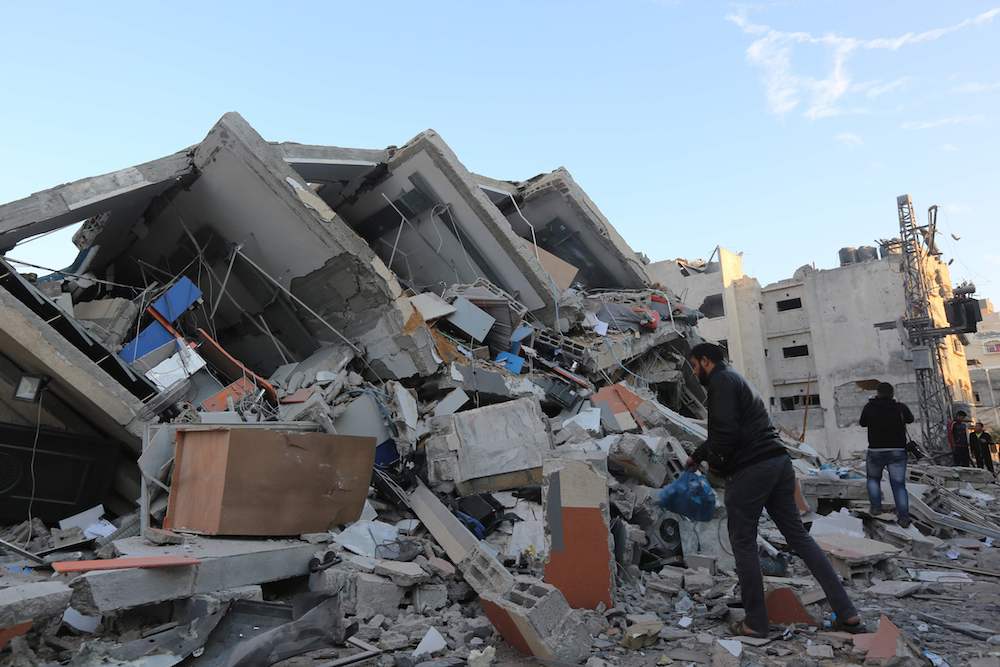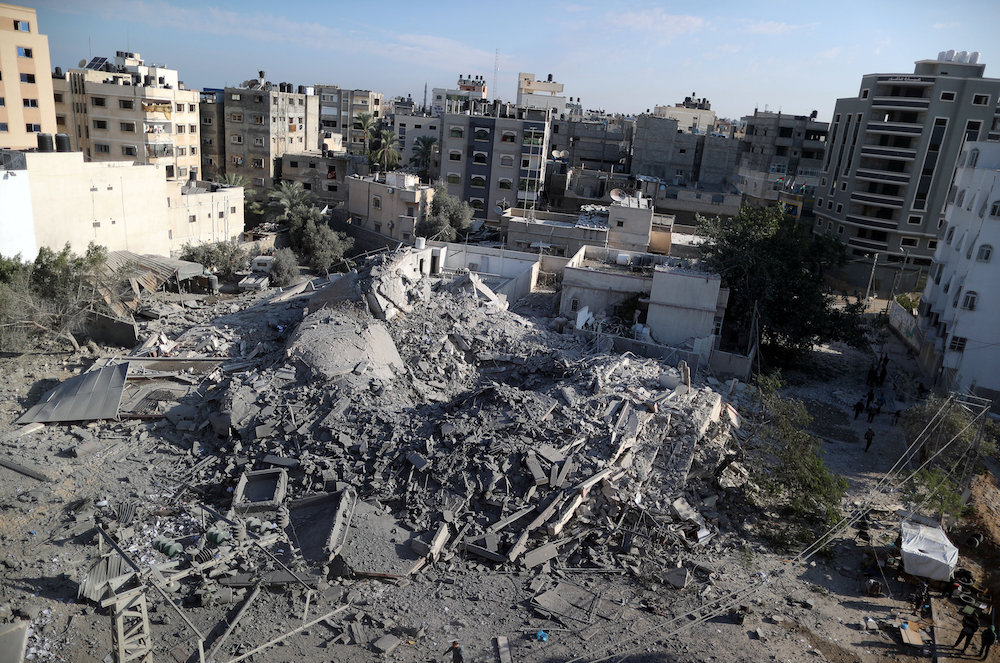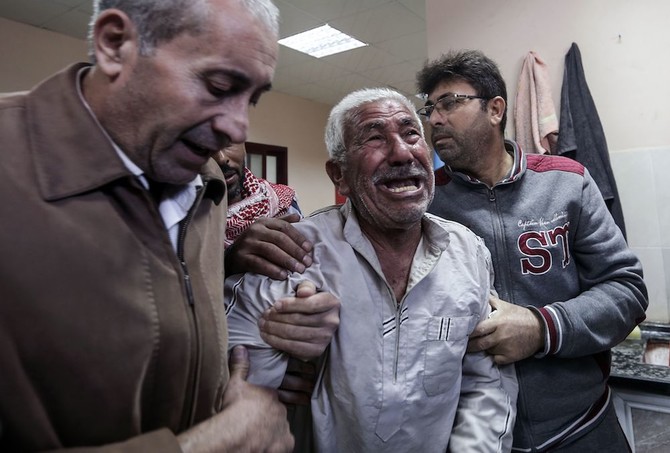GAZA: Palestinian militants and Israel held their fire late on Tuesday following an Egyptian mediation effort, bringing a relative calm to the Gaza frontier after the fiercest rocket salvoes and air strikes since the 2014 war.
The enemies made clear the pause was an armed stand-off rather than a long-term accommodation.
Fighting died down at 5 p.m. (1500 GMT) and a Palestinian official briefed on the negotiations said Gaza factions ceased firing as part of a deal proposed by Egypt. Israeli officials confirmed Cairo had been involved in Tuesday's arrangement.
Since Monday, Israeli air strikes had killed seven Palestinians, at least five of them gunmen, and destroyed several buildings used by Gaza's ruling Hamas Islamists.
Rocket attacks from Gaza sent residents of southern Israel to shelters, wounding dozens and killing a Palestinian labourer from the occupied West Bank.
The flare-up was triggered by a botched Israeli commando incursion on Sunday but the surge of violence has been stoked by the economic plight of the Gaza Strip, which Israel blockades in hope of isolating Hamas, an Islamist movement designated a terrorist group by the West.
The exchanges were the fiercest since the Gaza war in 2014, the third between Israel and Hamas in a decade as part of the wider Israel-Palestinian conflict. In that 50-day war, more than 2,100 Palestinians were killed Gaza, most of them civilians, along with 66 Israeli soldiers and seven civilians in Israel.
The joint command of the Palestinian armed factions in Gaza said they would abide by a ceasefire "as long as the Zionist enemy does the same."
Hamas, which has ruled the packed and impoverished coastal enclave since 2007, claimed victory. Spokesman Abdel-Latif Al-Qanoua said the militants had "taught the enemy a harsh lesson and made it pay for its crimes."
Israeli security minister Yuval Steinitz said after a cabinet debate lasting several hours that he knew of no formal truce.
Rather, he told Ynet TV, Israel had "landed a harsh and unprecedented blow on Hamas and the terrorist groups in Gaza, and we will see if that will suffice or whether further blows will be required."
While many Palestinians celebrated in the streets, in Israel the response was mixed. Dozens of residents of bombarded southern villages blocked an Israeli traffic junction and burned tyres in protest at what they deemed a government capitulation.
Hamas and other armed factions fired over 400 rockets or mortar bombs across the fenced border after carrying out a surprise guided-missile attack on Monday on a bus that wounded an Israeli soldier, the military said.

The remains of the building for Hamas' Al-Aqsa TV in Gaza. (AFP)
Hamas said it was retaliating for a botched Israeli commando raid in Gaza that killed one of its commanders and six other gunmen on Sunday. An Israeli colonel was also killed in that incident.
Sirens rang out in southern Israeli towns on Tuesday and people ran for shelter after Palestinian rockets crashed into several homes overnight. The military said the Iron Dome anti-rocket system intercepted more than 100 projectiles.
Israel responded with dozens of air strikes, hitting buildings overnight that included a Hamas intelligence compound and the studios of Hamas’s Al-Aqsa Television, whose employees had received advance warnings from the military to evacuate.
In aerial attacks on Tuesday, Israel’s military said it took out a rocket-launching squad and fired at several Palestinians infiltrating through the border fence around Gaza, which Israel keeps under blockade.
Violence has simmered since Palestinians launched weekly border protests on March 30 to demand the easing of the blockade on Gaza and rights to lands lost in the 1948 war of Israel’s founding. Israeli troops have killed more that 220 Palestinians during the confrontations, which have included border breaches.

The remains of a building that was destroyed by Israeli air strikes, in Gaza City. (Reuters)
The overnight salvoes were the fiercest since the seven-week Gaza war in 2014 between Israel and Gaza militants.
In Gaza City, people gathered in front of a large mound of debris that was once a multi-floor structure. It was flanked by five-story buildings still standing after the air strike, their shattered stone facades adding to the tall pile of rubble.
In the Israeli coastal city of Ashkelon, a video shot by a resident showed a bleeding woman, lying in the debris of an apartment and covered by dust, weakly raising her arm. She was taken to hospital in critical condition.
The body of a man, killed when a rocket hit the home, was next to her. He was identified by Israeli officials as a Palestinian from Halhoul, in the Israeli-occupied West Bank. Israel Radio said he had a permit to work in Israel.
Israeli Prime Minister Benjamin Netanyahu, who said on Sunday he hoped to avoid another Gaza war and reach an “arrangement” that would also ease Palestinian economic hardship, convened his security cabinet to discuss Israel’s next moves.
A Palestinian official said Egypt and the United Nations had stepped up efforts to end the current round of fighting.
“The (Palestinian factions) agreed to hold fire to give Egyptian efforts to end Israeli aggression a chance, but the factions will respond to every Israeli attack,” the official said.
Since the 2014 war, both Hamas and Israel have pulled back after brief bouts of fighting from another large-scale conflict.
A statement issued by militant groups in Gaza said Ashdod, a major Israeli port just north of Ashkelon, and Beersheba, the biggest city in southern Israel, would be hit next if Israel didn’t cease fire.
In Gaza, Israeli missiles flattened seven buildings, mostly in Gaza City including the TV station. Witnesses said warning missiles, which carry small warheads, were fired first.
Abdallah Abu Habboush, 22, said he was awakened by shouts from neighbors to get out of his residential building after what Israel terms the “tap on the roof” warning. They all gathered in a room on the first floor to wait out the attack.
“Old men who were with us fainted because of the smoke,” he said, adding that he had no idea why the structure was hit. Conricus said all of the buildings targeted by the Israeli military were “owned, operated and used by Hamas.”
Egypt, which borders Gaza to the south, urged Israel to back down. The United States, whose peace mediation has been stalled since the seven-week war in 2014, condemned Hamas.
Hamas, which is branded a terrorist group in the West, and Israel have fought three wars since the Islamist movement took control in Gaza in 2007, two years after Israel withdrew settlers and soldiers from the small coastal territory.





























